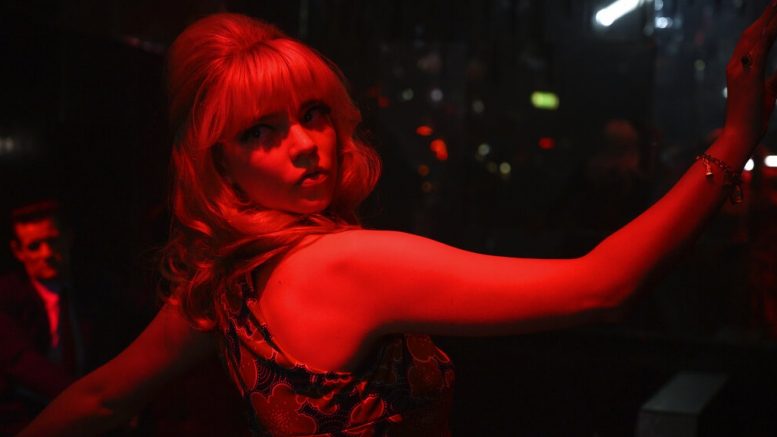The Associated Press
Who knew that digging the Kinks could be so dangerous?
“The Kinks Are the Village Green Preservation Society” (an album good enough to die for, truth be told) is one of the records that Eloise Turner (Thomasin McKenzie) stuffs into her suitcase when she gleefully packs for London. Eloise has long fantasized about living in the city, a dream built on the allure of London’s 1960s swinging past. Her grandmother (Rita Tushingham), who raised her and supplied the piles of vinyl, watches Eloise’s great expectations with trepidation. Eloise’s mother embarked on a similar path, but years earlier killed herself.
“It’s not what you imagine, London,” she says.
In Edgar Wright’s “Last Night in Soho,” it doesn’t take long for the modern-day London to disabuse Eloise of her romantic notions. The city’s seedy underbelly she senses on her first cab ride. She arrives a naive fashion student, mocked by her classmates for her old-fashioned tastes. Eloise flees to a quiet apartment of her own, atop an old building in Soho, owned by an elderly landlady (the late Diana Rigg, in her final screen performance). There, she is magically transported to ‘60s London whenever she falls asleep and a bedside record player turns on. In her nighttime trips, she mirrors an aspiring chanteuse Sandie (Anya Taylor-Joy, soaking up the period style) on a glamorous romp through the heady era. But with time, her vicarious experience of the ’60s turns dark. Not all was so swinging, it turns out, particularly for a beautiful young woman trying to make her way in nightclubs full of leering men.
The set-up of “Last Night in Soho,” which opens in theaters Friday, is smashing but gets squandered by the film’s second half. There, a promising premise detours into a muddled murder mystery that stretches the supernatural concept too far to sustain. A movie that seemed determined to deconstruct genre tropes instead becomes overwhelmed by them.
It’s a shame because the subject of overindulged nostalgia could be a fruitful one for any film in our much-recycled movie era. But it seems tailormade for Wright, the energetic and clever British filmmaker of playful genre combos like “Shaun of the Dead” and “Baby Driver,” whose movies are populated by affectionate film references and well-timed needle drops. Anyone can relate to the pull a fabled time has on Eloise, but Wright’s own propensity for nostalgia seems to drive “Last Night in Soho.”
When Eloise is first transported to to 1965, Wright finds a way to make her present with Sandie, but not quite in the “Christmas Carol” ghostly way. Whenever Sandie passes a mirror, Eloise is reflected back. They are somehow spiritually intertwined. Initially, the experience is everything she’s imagined. Sandy and a dashing well-connected man (Matt Smith) whirl through nighttime Soho, skipping under the bright marquee of “Thunderball.” (Fittingly, “Last Night in Soho” will appear in theaters alongside another Bond, more than 50 years later.)
Eloise soon can’t wait to hop back into bed. But after a few nights, Sandy’s hopeful start as a performer has been cynically sidetracked into a tawdry backup-dancer act. Backstage, the reality is significantly worse. Eloise’s dream of the ‘60s turns into a nightmare. But just when you think “Last Night in Soho” is going to go deeper into Eloise’s nostalgia and relationship to her own present, she becomes almost zombie-fied by the harrowing visions. Her journey seems to run out midway through the movie.
The nightmare turns increasingly real, and even connects to certain figures in Eloise’s modern day. Terence Stamp figures prominently, as he always does. But as much as his presence is electrifying, the character gives him little to work with. Michael Ajao plays a sweet student suitor of Eloise. That “Last Night in Soho,” which Wright wrote with Krysty Wilson-Cairns, dispels the allure of the ‘60s to Eloise isn’t the problem. It’s that once the movie, so vividly shot by cinematographer Chung-hoon Chung, reaches that conclusion, it bogs down with ghoulish B-movie jump scares.
But while neither of their character’s gets enough depth, McKenzie and Taylor-Joy sustain “Last Night in Soho,” a movie filled with reflections to both past fiction horrors (“Straight on Till Morning, “Suspiria”) and today’s #MeToo terrors.
“Last Night in Soho,” a Focus Features release, is rated R by the Motion Picture Association of America for bloody violence, sexual content, language, brief drug material and brief graphic nudity. Running time: 116 minutes. Two and a half stars out of four.




































